Our journey continues in the memory of the legendary cartoons that marked the 80's (and not only!) with one of the most loved and iconic titles: Lady Oscar. The manga is by Riyoko Ikeda and is inspired by the biography of Marie Antoinette, the most famous queen of the European courts. After Holly and Benji, Mila and Shiro, the Tiger Man, The Great Mazinger, Ninja Turtles to the rescue, Hello Spank! e Gigi La Trottola, we therefore move to France, to discover court scandals and secret loves. Especially to delve into riots and Oscar's particular life.
The plot of Lady Oscar
The series takes place in France, exactly in the last years of the ancien régime, and tells the life in the court of Versailles and the years of the revolution of 1789.
Lady Oscar and the arrival of the young Marie Antoinette
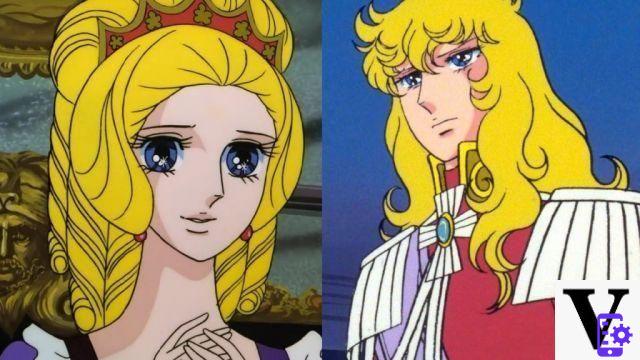 Marie Antoinette of Austria, daughter of Empress Maria Theresa, in 1770 she was betrothed to the dauphin of France Luigi Augusto, grandson of Louis XV. Arrived in France she knows Oscar Francois de Jarjayes, commander of the Royal Guard, who will therefore take care of his protection. Oscar, from an early age, was raised as a boy and with strict rules. The story of Oscar and the Queen goes hand in hand and is connected in many ways. A very important friendship immediately blossomed between the two, which over the years will turn into an absolute loyalty of the protagonist to the sovereign.
Marie Antoinette of Austria, daughter of Empress Maria Theresa, in 1770 she was betrothed to the dauphin of France Luigi Augusto, grandson of Louis XV. Arrived in France she knows Oscar Francois de Jarjayes, commander of the Royal Guard, who will therefore take care of his protection. Oscar, from an early age, was raised as a boy and with strict rules. The story of Oscar and the Queen goes hand in hand and is connected in many ways. A very important friendship immediately blossomed between the two, which over the years will turn into an absolute loyalty of the protagonist to the sovereign.
The quarrels between Marie Antoinette and the Countess du Barry
The Queen's life in the new court is by no means easy. The problems arise immediately due to the clashes with the Countess du Barry, favorite and lover of Louis XV. Marie Antoinette does not accept her condition and also avoids speaking to her. After some time and with a lot of pressure from her mother Maria Theresa, the princess agrees to speak with Madame du Barry. Everything happens on the occasion of the New Year of 1772. On the death of Louis XV due to smallpox on 10 May 1774, Louis XVI and Marie Antoinette are proclaimed sovereigns of France. This also means the end of the race for the Countess du Barry who is turned away from the court.
Maria Antonietta and Oscar "rivals in love": Count Hans Axel von Fersen
 Before the meeting with the count Hans Axel von Fersen, Lady Oscar's decision to live like a man has never wavered. Everything changes when the Swedish count arrives in France and takes part in a masked ball. It's love at first sight for Oscar. Like her, however, too Queen Marie Antoinette loses her head for this beautiful noble who, moreover, reciprocates her. Theirs becomes a secret and tormented love that, inevitably, after a while begins to create malicious rumors. This forces Fersen to leave the country for the Queen's sake. For Marie Antoinette this is a very hard blow that leads her to be very fragile. In this period he falls under the negative influence of a noblewoman: the Countess of Polignac. This manages to win the queen's trust and pushes her to waste money on frivolous pursuits, such as fashion and gambling.
Before the meeting with the count Hans Axel von Fersen, Lady Oscar's decision to live like a man has never wavered. Everything changes when the Swedish count arrives in France and takes part in a masked ball. It's love at first sight for Oscar. Like her, however, too Queen Marie Antoinette loses her head for this beautiful noble who, moreover, reciprocates her. Theirs becomes a secret and tormented love that, inevitably, after a while begins to create malicious rumors. This forces Fersen to leave the country for the Queen's sake. For Marie Antoinette this is a very hard blow that leads her to be very fragile. In this period he falls under the negative influence of a noblewoman: the Countess of Polignac. This manages to win the queen's trust and pushes her to waste money on frivolous pursuits, such as fashion and gambling.
The story of Jeanne and Rosalie
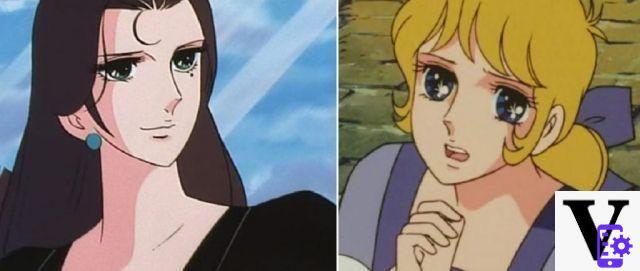 At the same time two girls from the slums of Paris, Jeanne and Rosalie, arrive at court with different paths. Both are daughters of a deceased person noble of the Valois dynasty, decayed over time, and of a poor woman. The two girls have diametrically opposed characters. Jeanne, shrewd and ambitious, leaves her family and manages to be adopted by a noblewoman. In fact, the girl has a diabolical plan that also leads her to kill her adoptive mother after having prepared a false will in her favor. Rosalie, on the other hand, honest and very fond of her biological mother, dedicates herself completely to her. Own Rosalie knows Oscar in a particular episode. The young woman, looking for money, stops her carriage one evening and, believing it to be a man, offers herself to Oscar. The latter, moved, gives her a gold coin.
At the same time two girls from the slums of Paris, Jeanne and Rosalie, arrive at court with different paths. Both are daughters of a deceased person noble of the Valois dynasty, decayed over time, and of a poor woman. The two girls have diametrically opposed characters. Jeanne, shrewd and ambitious, leaves her family and manages to be adopted by a noblewoman. In fact, the girl has a diabolical plan that also leads her to kill her adoptive mother after having prepared a false will in her favor. Rosalie, on the other hand, honest and very fond of her biological mother, dedicates herself completely to her. Own Rosalie knows Oscar in a particular episode. The young woman, looking for money, stops her carriage one evening and, believing it to be a man, offers herself to Oscar. The latter, moved, gives her a gold coin.
The turning point for Rosalie
Some time later Rosalie's mother is the victim of an unpleasant episode. The woman ends up under the wheels of the carriage Countess of Polignac. But it is just before dying in Rosalie's arms that the woman makes a shocking revelation: she is not his real mother, who is actually a noblewoman. Rosalie is shocked by these words but has no time to think about it. In fact, his only goal is to get to Versailles, find the murderer of his adoptive mother and take revenge. Lady Oscar thus decides to host her at her home and educate her so that she can enter the court. Fate, however, has another trick in store for her: it is precisely at court that she discovers that his real mother it is that countess of Polignac who killed his foster mom. Shortly after this discovery, Charlotte de Polignac, Rosalie's XNUMX-year-old half-sister, commits suicide to escape an unwanted marriage imposed on her by her mother.
Queen Marie Antoinette changes her life
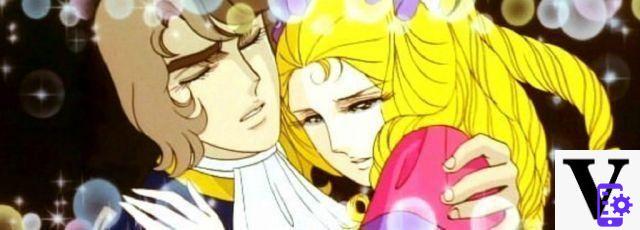 After a few years away, the Earl of Fersen he returns to France and inevitably gets closer to Marie Antoinette who risks causing a scandal at court for the still strong feelings she has for the man. Also on the advice of Oscar, the count leaves the country again and goes to fight overseas alongside the American revolutionaries. The departure of the man leads Marie Antoinette to give a turn to her life. After the birth of the heirs to the throne, he moves away from court life and retires with his children to the Petit Trianon, a private residence, arousing the hatred of the high nobility.
After a few years away, the Earl of Fersen he returns to France and inevitably gets closer to Marie Antoinette who risks causing a scandal at court for the still strong feelings she has for the man. Also on the advice of Oscar, the count leaves the country again and goes to fight overseas alongside the American revolutionaries. The departure of the man leads Marie Antoinette to give a turn to her life. After the birth of the heirs to the throne, he moves away from court life and retires with his children to the Petit Trianon, a private residence, arousing the hatred of the high nobility.
"The case of the necklace"
Meantime Jeanne Valois de la Motte organizes a deception to hit the crown. In the name of Marie Antoinette, he bought a very expensive necklace made by a Paris jeweler for Madame du Barry. The plan is successful thanks to the cardinal of Rohan. The latter is in fact in love with the queen and, therefore, easily maneuverable. Thus the case of the necklace breaks out, casting heavy shadows on the queen's public reputation. Once discovered and arrested, after a trial made up of continuous twists in which she accuses Marie Antoinette of being the architect of the intrigue, justice is done. Jeanne is sentenced to be branded as a thief.
Lady Oscar and the dance with Fersen
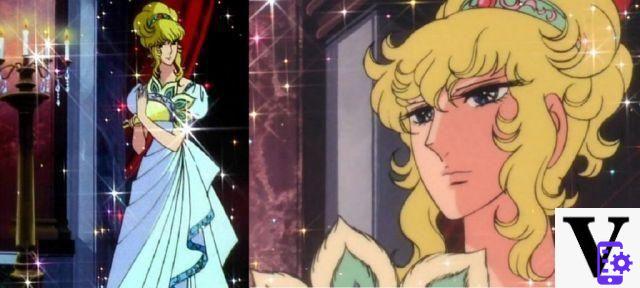 Shortly after the story of the series, Fersen returns from America. An important ball is held at court and, moved by her unforgettable feelings for him, Oscar decides for the first time to take off his officer's uniform and wear an elegant lady dress. In fact, she wants to participate in the dance and dance with the count she is so in love with. The scene, unique and alone, is exciting: no one recognizes it but everyone is dazzled by its beauty. He will be able to dance with Fersen, like the others enchanted by her, but it is during that dance that he recognizes her as she runs away, now aware that in his heart there is only room for Marie Antoinette.
Shortly after the story of the series, Fersen returns from America. An important ball is held at court and, moved by her unforgettable feelings for him, Oscar decides for the first time to take off his officer's uniform and wear an elegant lady dress. In fact, she wants to participate in the dance and dance with the count she is so in love with. The scene, unique and alone, is exciting: no one recognizes it but everyone is dazzled by its beauty. He will be able to dance with Fersen, like the others enchanted by her, but it is during that dance that he recognizes her as she runs away, now aware that in his heart there is only room for Marie Antoinette.
Andrè Grandier and the tormented love for Oscar
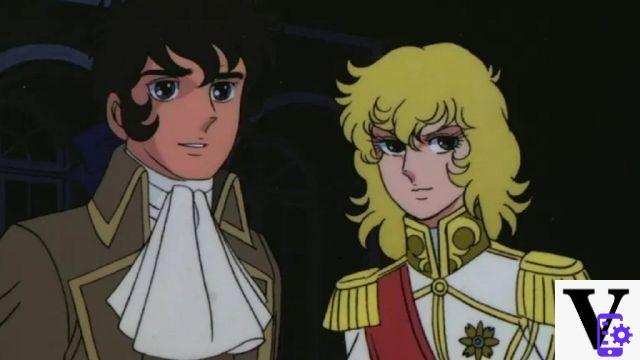 Parallel to the political and court events, there is a private story, as beautiful as it is tormented: the relationship between Andrew and Oscar. The two grow up together: he is the grandson of the housekeeper of the Jarjayes family and, over the years, he will become a trusted friend of Oscar, supporting her in all her battles. But if for Oscar he is like a brother, André is madly in love of her since childhood. A love that he cultivates in silence, always remaining by his side. That is until, now adults, André decides to confess his feelings to her. However, he is rejected. Lady Oscar will understand that she loves him only years later, the day before the start of the French Revolution and their death.
Parallel to the political and court events, there is a private story, as beautiful as it is tormented: the relationship between Andrew and Oscar. The two grow up together: he is the grandson of the housekeeper of the Jarjayes family and, over the years, he will become a trusted friend of Oscar, supporting her in all her battles. But if for Oscar he is like a brother, André is madly in love of her since childhood. A love that he cultivates in silence, always remaining by his side. That is until, now adults, André decides to confess his feelings to her. However, he is rejected. Lady Oscar will understand that she loves him only years later, the day before the start of the French Revolution and their death.
The Black Knight
Immediately after the affair of the dance with Fersen, Lady Oscar is involved in the case of the Black Knight. gentleman thief who carries out numerous thefts against the nobles to donate all his booty to the poor. In the course of an attempted capture, her squire André Grandier, to save her life, is injured in the eye with very serious consequences, in fact he loses his sight. Later it is discovered that under the mask of the Black Knight is hiding Bernard Chatelet, a pro-revolutionary Parisian journalist, friend of Maximilien de Robespierre, who will eventually marry Rosalie. The thefts were carried out with the approval of the Duke of Orleans and were a way to discredit the royal family in the eyes of the nobility. Meanwhile, Oscar and Fersen, after a confrontation in which they clarify their feelings, they say goodbye forever. André, now blind in one eye, reveals to Oscar that he has always loved her, but she rejects him.
Oscar changes his life
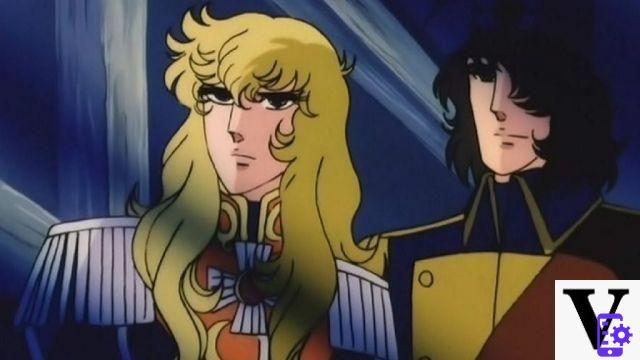 Oscar, deeply affected by what happened with Fersen and with André, he decides to change his life. He leaves the court and the queen. A strong decision that also implies the renunciation of the command of the Royal Guard. However, he obtained from Marie Antoinette the position of commander of the regiment of the French Guards in Paris. André, in order to always be at her side, decides to follow her and enlist.
Oscar, deeply affected by what happened with Fersen and with André, he decides to change his life. He leaves the court and the queen. A strong decision that also implies the renunciation of the command of the Royal Guard. However, he obtained from Marie Antoinette the position of commander of the regiment of the French Guards in Paris. André, in order to always be at her side, decides to follow her and enlist.
Towards the French Revolution
Immediately after the death of Marie Antoinette's eldest son, the events that will lead to the French Revolution take place. Oscar, discovering herself in love with André, takes the side of the people, abandoning the queen. The two fight side by side, dying in the same battle. They are in fact shot as revolutionaries at the hands of the soldiers of the Royal Guard. André is hit by a bullet on July 13, 1789, while Oscar, already weakened by the first symptoms of consumption, falls the following morning, during the riots of the assault on the Bastille. Marie Antoinette was killed on 16 October 1793, guillotined.
Lady Oscar: the heroine par excellence
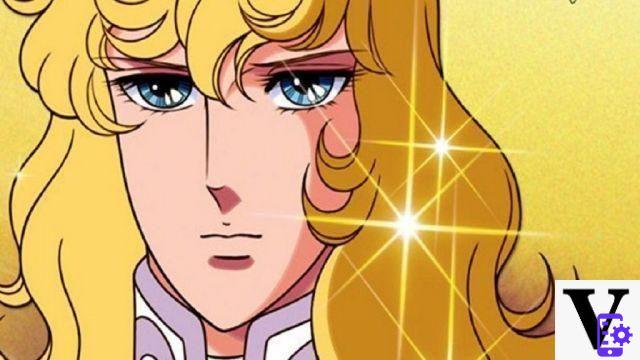 Of the heroines who have populated and populate souls, Lady Oscar it is certainly one of the most powerful for the story and the message it reveals. "The good father wanted a boy but alas, you were born" says the acronym that already clarifies everything: Oscar is a woman who is raised as a man but has the strength and stubbornness to become even stronger than many of them. Formidable, stubborn swordsman, from a very young age already commander of the Royal Guard, she lives her life as decided by her father but without abandoning her ideals. Her heart is right but, above all, it is a woman's heart, something of which she becomes fully aware first with the meeting of Fersen then, more mature, with the discovery of her great love for André. But Oscar is also great courage: that of abandoning the securities to take the right side, even fighting at the risk of one's life.
Of the heroines who have populated and populate souls, Lady Oscar it is certainly one of the most powerful for the story and the message it reveals. "The good father wanted a boy but alas, you were born" says the acronym that already clarifies everything: Oscar is a woman who is raised as a man but has the strength and stubbornness to become even stronger than many of them. Formidable, stubborn swordsman, from a very young age already commander of the Royal Guard, she lives her life as decided by her father but without abandoning her ideals. Her heart is right but, above all, it is a woman's heart, something of which she becomes fully aware first with the meeting of Fersen then, more mature, with the discovery of her great love for André. But Oscar is also great courage: that of abandoning the securities to take the right side, even fighting at the risk of one's life.
Manga Vs Anime
The anime is based on the manga of Iyoko ikeda entitled "Berusaiyu no bara", which translated means "The roses of Versailles". This, in fact, is the original title of the soul, which later became “Lady Oscar”. Ikeda was fascinated by the biography of Marie Antoinette by the Austrian writer Stefan Zweig, so he proposed to his publisher the idea of publishing a manga with a historical background. This made its Japan debut in 1972 in 82 chapters and it was a huge success.
Apparently Oscar really had to be a man: this is how Riyoko Ikeda had imagined the protagonist, moreover inspired by a man who really existed, who later became one of the drivers of the revolution. Finally, not convinced by the character, she decided to create a woman, Lady Oscar, who would live as a man. Choice that was then the main source of the success of the story.
If the manga is hugely successful in Japan, the same is not true for its anime adaptation. This arrives in Italy in 1982 and immediately becomes an unmissable event for many (so much so that even today it is one of the most replicated cartoons in the country). The television anime consists of 40 episodes lasting about 23 minutes each and was made by the Japanese Tokyo Movie Shinsha in 1979.
Lady Oscar: the acronym
In Italy, the cartoon is associated with the initials Lady Oscar, composed and sung by the group I Cavalieri del Re, with soloist Clara Serina. The song was so successful in the eighties that it reached the Top Ten in the hit parade.
In 1990 Mediaset decided to change the title of the anime to A sword for Lady Oscar. This led to the change of the theme song which was replaced with the homonymous song written by Alessandra Valeri Manera, initially entrusted to Enzo Draghi, then, the following year, to Cristina D'Avena.
The characters of Lady Oscar
Oscar Francois de Jarjayes - Japanese voice: Reiko Tajima; Italian voice: Cinzia De Carolis.
André Grandier – Tarō Shigaki; Massimo Rossi
Marie Antoinette of Austria – Miyuki Ueda; Laura Boccanera
Hans Axel von Fersen - Nachi Nozawa; Luciano Roffi
Alain de Soissons– Shunji Yamada; Sergio Luzi
Bernard Chatelet - Akio Nojima; Sergio Luzi; Oliviero Dinelli
Countess of Barry - Ryōko Kinomiya; Franca De Stradis
Jeanne Valois – Yoneko Matsukane; Susanna Fassetta
Louis XVI – Yoshito Yasuhara; Marco Guadagno
Grandmother Grandier - Hisako Kyōda; Franca Dominici
Maximiliene Robespierre – Katsuji Mori; Giorgio Locuratolo
Earl of Mercy – Ichirō Murakoshi; Silvio Anselmo
Nicolas de la Motte – Michihiro Ikemizu; Oliviero Dinelli
Duca d’Orleans – Osamu Ichikawa; Mauro Bosco
Contessa Gabrielle de Polignac - Reiko Mutō; Serena Spaziani
Rosalie la Morliere- Rihoko Yoshida; Daniela Caroli
Victor Clement de Girodelle – Keiji Mikage; Giuliano Santi
Charlotte – Kazue Komiya; Valeria Perilli
Louis Antoine de Saint-just – Toshio Furukawa
Louis XV – Hisashi Katsuta; Sandro Pellegrini
General of Jarjayes – Kenji Utsumi; Romano Malaspina
Cardinal of Rohan – Junkichi Yarita; Pierluigi Zollo
 The rose of Versailles. Lady Oscar collection (Vol. 1-5)
The rose of Versailles. Lady Oscar collection (Vol. 1-5)
- Ikeda, Riyoko (Author)


























